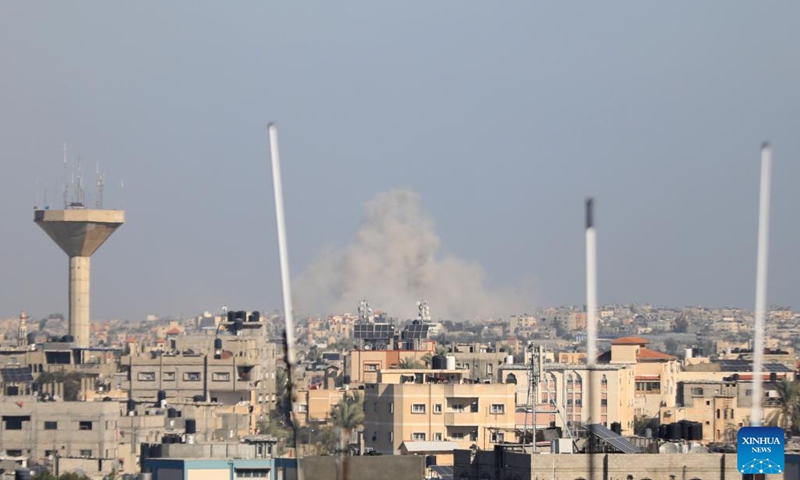China and the League of Arab States issued a joint statement on the Israel-Palestine conflict on Sunday, urging an immediate and comprehensive cease-fire and stressing the two-state solution as “a basis” for any future settlement concerning the fate of the Palestinian people in the Gaza Strip and the West Bank.
While China is going all out to advocate for a cease-fire of the Gaza conflict, restoration of peace and protection of the safety of civilians, the US and the UK are trying to shift public attention from the conflict to other tensions including those in the Red Sea, in an attempt to portray themselves as defenders of order, Chinese experts pointed out, while noting that the rising Red Sea tensions are rooted in the Israel-Palestine conflict, and only after the conflict is solved can spillover tensions be eased.
On Sunday, after Chinese Foreign Minister Wang Yi, also a member of the Political Bureau of the Communist Party of China Central Committee, met with Arab League Secretary-General Ahmed Aboul-Gheit in Egyptian capital Cairo, the two sides issued the joint statement.
The statement noted that China and the Arab side support the holding of an inclusive dialogue with the participation of all Palestinian factions that is committed to achieving Palestinian reconciliation.
It called for an international peace conference with broad participation as soon as possible to promote the implementation of the two-state solution, and resuming peace talks between Palestine and Israel on this basis.
The two sides also expressed deep concern in the statement over the recent escalation of the situation in the Red Sea and stressed that the sovereignty and territorial integrity of Yemen should be respected while ensuring the safety of international commercial routes in the Red Sea, which is a priority for international peace and security.
With the current round of the Israel-Palestine conflict entering its 100th day on January 14 local time, in Gaza, fierce fighting continues. At the same time, the negative spillover effect is accelerating after the US and UK conducted a new strike on Yemen’s Red Sea port city of Hodeidah on Sunday evening, according to the Houthi-run al-Masirah TV.
Xinhua News Agency noted that the US and Britain have stated that the strikes came in an attempt to deter the Yemeni Houthi group from launching further attacks on international shipping in the Red Sea, a vital waterway for global trade.
The Houthis said that their operations aimed to prevent what it called “Israeli-linked ships” from passing through the Red Sea until Israel ends its attack and siege on the Gaza Strip.
The US and its ally are apparently attempting to shift the focus from the original Israel-Palestine conflict, pointed out Li Weijian, a research fellow with the Institute for Foreign Policy Studies of the Shanghai Institutes for International Studies.
Li told the Global Times on Monday that the US, due to its unconditional support for Israel and its unwillingness to effectively persuade it to cease fire, is facing significant international pressure and criticism, making its current situation quite awkward.
As a result, the US hopes to shift public attention by focusing on the Houthis and demonstrating its sense of “justice” in “protecting the order” of international shipping in the Red Sea, Li said.
However, it is clear to everyone that if the Israel-Palestine issue is not resolved, the airstrikes by the US and the UK will not have a positive effect and may even escalate the conflict, the expert noted.
If Red Sea tensions spread, it will affect trade activities along the Red Sea and the Persian Gulf, leading to increased time and costs for shipping and even impacting oil prices, Zhu Yongbiao, executive director of the Research Center for the Belt and Road at Lanzhou University, told the Global Times on Monday.
The overall impact has just begun, and whether Red Sea tensions will have a greater impact on the future global economy due to confrontation between the Houthis and the US is being further observed, Li said.
But he believes that the Biden administration will focus more on the US elections in 2024 and avoid opening a third front.
Since the outbreak of the latest Palestinian-Israeli conflict, China has all long stood on the side of equity and justice and done our best to realize a ceasefire, restore peace and protect civilians, Mao Ning, spokesperson for the Chinese Foreign Ministry, said at a press conference on Monday. She cited remarks by Wang Yi in Egypt as stressing that cease-fire is the prevailing priority, and humanitarian aid is the imperative moral responsibility.
The spokesperson continued by saying that the future arrangement of Gaza must fully respect Palestinians’ aspiration, and the two-state solution is the sure path to a just settlement of the Palestinian issue. China will continue to take an impartial stand, play its role as a major responsible country, and relentlessly work with the international community for a comprehensive, just and sustainable settlement of the Palestinian issue at an early date, she said.
However, some Western media outlets such as Bloomberg are trying to smear China’s role in the conflict.
Starting with the claim that “As the US and UK launch airstrikes to stop Iran-backed Houthi rebels from attacking ships in the Red Sea, China again finds itself happily sitting on the sidelines,” Bloomberg attempts to defame China’s efforts during the conflict and portray China as a “country just paying lip service.”
However, the old tricks used to smear China are clearly untenable, as Chinese experts pointed out that the United Nations has not authorized the US or its ally to air strike against the Houthis.
The US, which is pouring fuel on the fire in the Israel-Palestine conflict, also wants to play the role of fireman, and at the same time accuses other countries of watching from the sidelines. But in fact, the US is responsible for the conflict, Zhu said.
“We have a common responsibility to ensure the security of the Red Sea, and we will not be deceived by the US to fuel such tensions,” Li said.
As many problems are rooted in the Israel-Palestine conflict, we should stress a return to the solution of the fundamental problem on the road, he stated, noting that as long as the conflict has a comprehensive cease-fire, Red Sea tensions will naturally calm down.
(Global Times)




